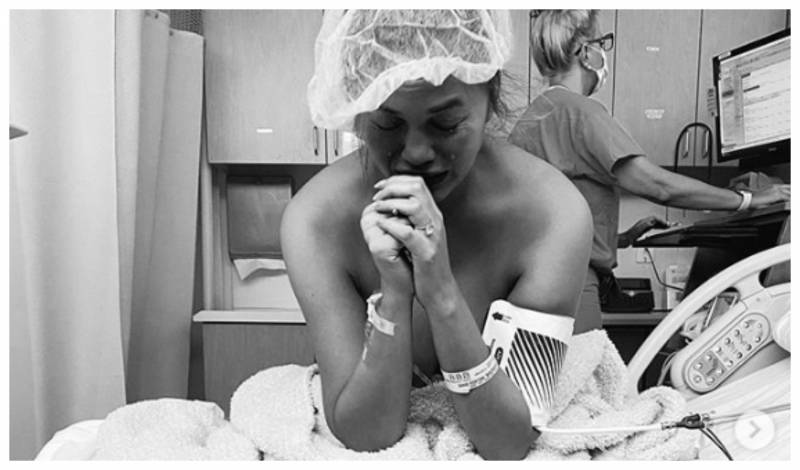Last night, Chrissy Teigen and John Legend lost their third child, less than two weeks after Teigen was put on bed rest. The couple announced the news on social media immediately, accompanied by a photo of Teigen, bereft and weeping in a hospital bed.
Chrissy Teigen Sharing Her Miscarriage Agony Will Help Thousands of Women

“We are shocked and in the kind of deep pain you only hear about,” Teigen wrote. “The kind of pain we’ve never felt before. We were never able to stop the bleeding and give our baby the fluids he needed, despite bags and bags of blood transfusions. It just wasn’t enough.”
The speed and rawness of the post was surprising, even from a woman whose unfiltered sharing has made her one of the most popular figures on social media. In the middle of the most painful moment of her life, it turns out, Chrissy Teigen still tells it like it is.
Teigen’s decision to speak publicly during the couple’s shock and grief isn’t just a continuation of their desire to live openly and authentically in the public eye. It’s also not just the quickest way to get painful news out. Their honesty in this moment is undoubtedly going to help couples, but especially women, who have similar experiences in the future.
Figures vary depending on where you look, but 10–25% of American pregnancies end in miscarriage. That’s about a million per year. And yet most women who do lose a pregnancy experience guilt after the fact. That’s in no small part due to common misconceptions and old myths around what causes it to happen.
One 2015 research study found a majority of respondents believed that most pregnancy losses were caused by either stress or the lifting of heavy objects. Between 20% and 41% believed miscarriage could be caused by an STD, previous use of contraceptives, or even simply just having an argument. Not only are none of these things listed as potential risks by the Mayo Clinic, the reality is that 60% of pregnancies fail due to genetic problems within the fetus that are not caused by anything the mother did.
The misplaced guilt can also be accompanied by shame. Which is not that surprising when one considers how socially conditioned women are to feel shame about our bodies, even under normal circumstances. Shame over their natural functions, shame (for the more religious among us) over their sinfulness and, most of all, shame over their imperfections. When our bodies are anything but perfect, women are taught, you’d better cover up and hide until you fix it.
The photo Teigen posted of herself, broken and in all her grief, was decidedly and refreshingly unashamed. This, she told us with that image, is the aftermath of an accident; a cruel twist of fate; an imperfection that could not be fixed. By posting the picture, Teigen didn’t just face the loss head-on, she asked us to look at it with her. She asked us to understand. And in doing that, she forced America to take a major step forward in destigmatizing pregnancy loss and its aftermath.
Other celebrities have bravely shared their miscarriages with the public before. Beyoncé, Tori Amos and Lily Allen all wrote songs about theirs. Courtney Cox, Sophia Loren and Giuliana Rancic all openly discussed the devastation of their miscarriages. But these stories came later, in a calmer place, after a moment to process, and after the tears had dried.
Teigen didn’t wait to get herself together. And in responding the way she did, she didn’t just tell women everywhere it’s okay to not be okay, she showed them what the world falling apart looked like. That she did it in a format usually beholden to filters and projections of perfection was especially revelatory.
Then, most remarkably of all, Teigen went on to show us all how to move forward in any time of crisis. “On this darkest of days, we will grieve, we will cry our eyes out. But we will hug and love each other harder,” she wrote, “and get through it.”

